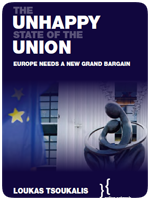Click ‘Download PDF’ to read the full Policy Paper.
Also available the Spanish version: ‘El triste estado de la Unión. Europa necesita un nuevo gran pacto’.
Executive summary

The crisis in Europe manifests itself in many different ways, with economies languishing, some indeed imploding, anti-systemic parties on the rise, a growing disconnect between politics and society, and support for European integration reaching an historical low. All this is coupled with growing fragmentation between and within countries.
Some of the problems go further back. With time, the European project became much bigger, more intrusive and less inclusive, while external competition intensified in a rapidly globalising world. The permissive consensus on which it had rested for several decades can no longer be taken for granted.
The creation of the euro was the most daring act of integration and the driving force behind it was politics rather than economics. It is now clear that Europeans had willed monetary union but not the means to make it viable in the long run. In that sense, the euro was a terrible mistake and we are now paying the price.
It was a faulty design, but it was also bad luck that the first real test came with the biggest international financial crisis since 1929. The 2007/8 crisis was the result of colossal failures of markets and institutions that were certainly not confined to Europe. Yet its impact also revealed the weakness of the Maastricht construction, as well as the fragility of intergovernmental and inter-country bonds. It also uncovered all kinds of problematic children in the European family and exposed the limitations of political power set against a borderless economy that sets the pace and often dictates the rules.
Yet, the worst has been avoided so far against the expectations of many euro-doubters. The demise of the euro would have had incalculable economic and political consequences within the currency union and beyond. Many ‘unthinkables’ have happened in order to prevent it. On the other hand, adjustment has proved more painful and lasted much longer in the euro area than anywhere else. European political leaders have tried to buy time, showing a strong survival instinct whenever they reached the edge of the precipice, but precious little strategic vision. Who pays the bill in order to exit from the crisis? This remains the most difficult political question of all.
Europe has been divided between creditors and debtors, between euro countries and the rest. Divisions run deep within countries as well, as inequalities continue to grow. Trust has been low, the economics flawed and the politics toxic. Meanwhile, the austerity forced upon the debtor countries has had devastating effects on their economy, society and the political system. Admittedly, those countries had lived on borrowed time and money for too long.
Some people believe or hope that the worst is now over. Markets have been relatively calm for some time, while countries are beginning to emerge out of painful adjustment programmes and the first signs of economic recovery have appeared. This is the optimistic scenario. Others however, are less sanguine. They remind us that Europe is courting with deflation, while growth is likely to remain modest, fragile and uneven in the foreseeable future. The large numbers of unemployed will be unable to find jobs any time soon and political extremism is on the rise. Public debt is now much higher than it was at the beginning of the crisis and private debt also remains very high. Europe seems to be facing the future on a wing and a prayer.
Germany has emerged as the indispensable country and lender of last resort – and Chancellor Merkel as the undisputable leader of Europe in crisis. The power balance has shifted within Europe. Germany enjoys a structural advantage in a monetary union that operates as a modern version of the gold standard and little else. Historical experience, however, suggests that it may not be viable for much longer unless the European monetary union also acquires a fiscal base as well as a legitimate political base on which it can stand.
The centrifugal forces are strong both between and within countries. What still keeps Europe together is the political glue that has solidified through several decades of close cooperation and, even more important, the fear of the alternative. There is much unhappiness with the state of the Union today and integration has turned into a negativesum game in the eyes of many Europeans. But still, the majority remain convinced that the costs of disintegration would be even higher. It is the equilibrium of terror in a sense, yet an equilibrium which is unstable and prone to accidents.
Europe needs a new grand bargain to break its Gordian knot. The initiative can only come from the strong, not from the weak. How much are the Germans willing or able to underwrite the European project? How much are the debtor countries (and others) willing or able to reform? And are the French willing or able to credibly reclaim their role as co-leaders? These are essential parts of the puzzle, although not sufficient. The new grand bargain will require a broad coalition of countries and the main political families in Europe to recognise the value of the European project and the need to give it new shape and form in a rapidly changing environment.
Supply-side economics and the goal of long-term fiscal consolidation need to be matched urgently with measures to boost demand and stimulate growth. Without credible answers to the questions of debt and bank recapitalisation, without a clear programme to strengthen the economic dimension of Economic and Monetary Union, the prospects for growth will be uncertain, if not grim, and the viability of the euro will degenerate further.
The European project needs to become more inclusive again, thus increasingly catering for the needs of those on the losing side of a long economic transformation that culminated in the big crisis of recent years. Europe’s conservative agenda today cannot provide an adequate response. Unless it changes, anti-systemic parties and protest movements will continue to have a field day, nationalism and populism as well. It would be extremely short-sighted to lump together all kinds of protest as populist, and simply dismiss them. Populism and growing Euroscepticism should serve instead as an alert for wounds that have been festering for years. It may turn into a red alert when the results of the European Parliament elections are announced in late May.
The euro has become a make or break issue for Europe. It has also become the centrepiece of the European project, and this is unlikely to change anytime soon. We must therefore draw the necessary conclusions. As it stands, euro governance is neither effective nor legitimate. It needs new policy instruments, stronger common institutions, more democratic accountability and an executive able to act with discretionary power. They will provide the balance against a set of constraining rules on national policies which are necessary as well. And all that leads to a new euro treaty that should be able to face the test of democracy in member countries, on the condition that no country has the right to stop others from going ahead and that each national parliament ‒ and/or citizens when a referendum is called ‒ is presented with a clear choice, namely in or out. Democratic legitimacy will have to be fought for; it is not a given.
Some European countries, notably the UK but also others, will not be willing or ready to take the political leap forward. There should be room for them under the bigger roof of the EU through a revision of the existing treaties. More flexibility and differentiation will be necessary in an EU of 28 and more.
If we continue with the muddling through, Europe will remain weak, internally divided and inward looking: an ageing and declining continent, increasingly irrelevant in a rapidly changing world and with a highly unstable and poor neighbourhood. The challenge is not just to save the common currency: it is to provide more effective management of interdependence, tame markets, create the conditions for sustainable development and more cohesive societies, strengthen democracy and turn regional integration once again into a positive-sum game: a tall order admittedly, but also a challenge worth striving for. More integration where needed and more national or local responsibility wherever possible: this could be the motto for Europe. If we succeed, we would also have useful lessons to teach the rest of the world.
Loukas Tsoukalis
Professor of European integration at the University of Athens, Visiting Professor at King’s College (London) and the College of Europe (Bruges).



